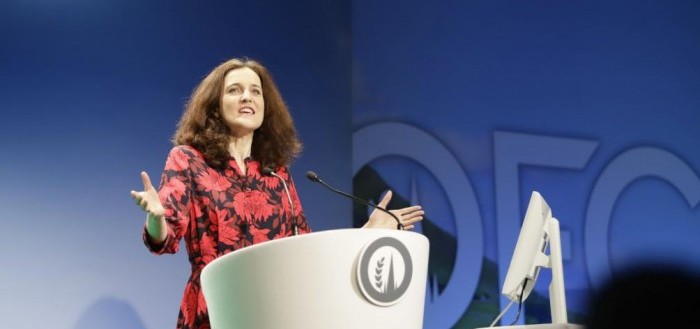Defra Secretary Theresa Villiers has today reintroduced the Agriculture Bill, setting out a new path for domestic agriculture policy in England after we leave the EU.
The big focus remains the environment, with a seven-year agricultural transition from the current direct payment regime to a system where farmers receive ‘public money for public goods’, such as better air and water quality, higher animal welfare standards, improved access to the countryside or measures to reduce flooding. There will also be a big focus on soil quality.
Much of this will be delivered through the new Environment Land Management (ELM) scheme, the pilots for which will begin early in the transition period, which will give farmers time to adjust to the new system. The first cuts to direct payments will come in 2021 and be used to fund ELMS pilots.
There is, however, more focus on food in this second iteration of the Bill. Defra said the new Bill champions British food by improving transparency and fairness in the supply chain from farm to fork. By collecting data from across the supply chain, the government will help food producers strengthen their negotiating position at the farm gate and seek a fairer return, the Department said.
Investing in new technology and research to ensure our world-renowned food producers remain competitive and innovative and in the foundations of food production, such as clean air, soils and water, will safeguard our food security, it added.
The Bill will also legally require any UK government to report regularly on food security to Parliament.
Later in the agricultural transition, the government plans to ‘delink’ Direct Payments from the requirement to farm the land, a requirement that currently exists under EU law.
“This will give farmers greater flexibility to plan for their future as these payments will be able to be used by farmers to invest in their business, diversify their activities or help new people enter the sector,” the Department said.
The funding available for Direct Payments for 2020 will be the same as for 2019. For subsequent years, the Government is committed to matching the current budget available to farmers in every year of this Parliament, while phasing out direct payments in favour of rewarding the provision of ‘public goods’.
Mrs Villiers said: “This is one of the most important environmental reforms for many years, rewarding farmers for the work they do to safeguard our environment and helping us meet crucial goals on climate change and protecting nature and biodiversity.
“We will move away from the EU’s bureaucratic Common Agricultural Policy and towards a fairer system which rewards our hard-working farmers for delivering public goods, celebrating their world-leading environmental work and innovative, modern approach to food production.
“We will continue to champion British produce and support farmers to adapt to our new pioneering approach to agriculture through a seven-year transition period in England, ensuring we unleash the potential of our farmers for the future.”
What’s new in the Agriculture Bill?
- Food security– a new requirement for the UK government to regularly report on food security to Parliament, demonstrating the importance we place on this subject. The report is likely to cover a range of current issues including global food availability, supply sources, the resilience of the supply chain, household expenditure on food, food safety and consumer confidence in food.
- Financial assistance monitoring – the Secretary of State will monitor, evaluate and regularly report on our financial assistance schemes.
- Soil quality – soil is specifically named in the Bill, so the Government can provide financial assistance to farmers for protecting or improving its quality, for example, for soil monitoring programmes and soil health research to support farmers with their decision-making and soil management.
- An animal traceability service – new powers have out into place allow a service provider to improve the collection and management of information relating to the identification, movement and health of animals.
- Fertiliser regulation – power to effectively regulate this industry as we leave the EU, including updating the definition of a fertiliser to take account of the latest technological advances.
- Organics regulation – powers to tailor organics regulation so that it works for UK producers and so we can continue to trade organic produce across the world.




